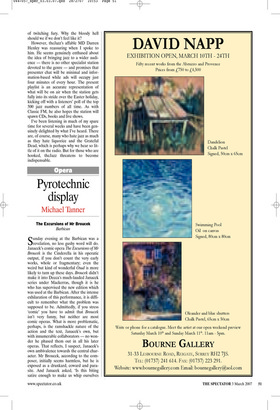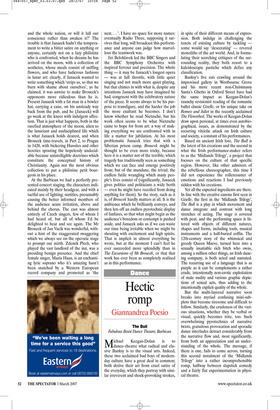Pyrotechnic display
Michael Tanner
The Excursions of Mr Broucek Barbican
Sunday evening at the Barbican was a revelation, no less gushy word will do. Janacek’s comic opera The Excursions of Mr Broucek is the Cinderella in his operatic output, if you don’t count the very early works, whole or fragmentary; even the weird but kind of wonderful Osud is more likely to turn up these days. Broucek didn’t make it into Decca’s much-lauded Janacek series under Mackerras, though it is he who has supervised the new edition which was used at the Barbican. After the intense exhilaration of this performance, it is difficult to remember what the problem was supposed to be. Admittedly, if you stress ‘comic’ you have to admit that Broucek isn’t very funny, but neither are most comic operas. What is more problematic, perhaps, is the ramshackle nature of the action and the text, Janacek’s own, but with innumerable collaborators — no wonder he phased them out in all his later operas. That reflects, I suspect, Janacek’s own ambivalence towards the central character. Mr Broucek, according to the composer, initially seems harmless, but he is exposed as a drunkard, coward and parasite. And Janacek asked, ‘Is this biting satire enough to make us whip ourselves and the whole nation, or will it lull our conscience rather than awaken it?’ The trouble is that Janacek hadn’t the temperament to write a bitter satire on anything or anyone, certainly not on a lazy philistine who is confronted, when he dreams he has arrived on the moon, with a collection of aesthetes, whose meals consist of sniffing flowers, and who have ludicrous fashions in lunar art: clearly, if Janacek wanted to write something which ‘strips us, so that we burn with shame about ourselves’, as he claimed, it was unwise to make Broucek’s opponents more ridiculous than he is. Present Janacek with a fat man in a bowler hat, carrying a cane, on his unsteady way back from the pub, and he (Janacek) will go weak at the knees with indulgent affection. That is just what happens, both in the rarefied atmosphere of the moon, alien to the luxuriant and undisciplined life which is what Janacek holds dearest, and when Broucek time-travels, in Part 2, to Prague in 1420, with bickering Hussites and other heretics spouting the hopelessly undecidable because unintelligible doctrines which constitute the conceptual history of Christianity. Again not the most obvious collection to put a philistine petit bourgeois in his place.
At the Barbican we had a perfectly presented concert staging, the characters indicated mainly by their headgear, and with a tactful use of lighting; surtitles, presumably causing the better informed members of the audience acute irritation, above and behind the chorus. The cast was almost entirely of Czech singers, few of whom I had heard of, but all of whom I’d be delighted to hear and see again. The Mr Broucek of Jan Vacik was wonderful, without a hint of the exaggerated swaggering which we always see on the operatic stage to prompt our mirth. Zdenek Plech, who played the vast landlord of the inn, was a presiding benign presence. And the chief female singer, Maria Haan, is an enchanting lyric soprano who it’s amazing hasn’t been snatched by a Western European record company and promoted as ‘the next... ’. I have no space for more names: eventually Radio Three, supposing it survives that long, will broadcast this performance and anyone can judge how marvellous the teamwork was.
Jiri Belohlavek led the BBC Singers and the BBC Symphony Orchestra with inspired fervour and precision. The whole thing — it may be Janacek’s longest opera — was at full throttle, with little quiet singing and not much more quiet playing, but that chimes in with what is, despite any intentions Janacek may have imagined he had, congruent with the celebratory nature of the piece. It seems always to be his purpose to transfigure, and the harder the job the more exultant he becomes. I don’t know whether he read Nietzsche, but his work often seems to be what Nietzsche came to hope for from art: a way of making everything we are confronted with in life a matter for jubilation. At his most problematic Janacek tries that with a Siberian prison camp. Broucek might be thought to be even more tricky, because here it is a matter not of the terrible, which tragedy has traditionally seen as something which we can face and emerge positively from; but of the mundane, the trivial, the endless futile wrangling which many people’s lives consist of (significantly, Janacek gives politics and politicians a wide berth — even he might have recoiled from doing anything for them). So the story, such as it is, of Broucek hardly matters at all. It is the ambience which he brilliantly conveys, and then lets off an endless pyrotechnic display of fanfares, so that what might begin as the audience’s boredom or contempt is pushed aside, and Janacek asks us if we can waste our time being irritable when we might be shouting with excitement and high spirits. That is implicit in almost everything he wrote, but at the moment I can’t feel he ever succeeded more splendidly than in The Excursions of Mr Broucek, or that that work has ever been as completely realised as in this performance.











































































 Previous page
Previous page